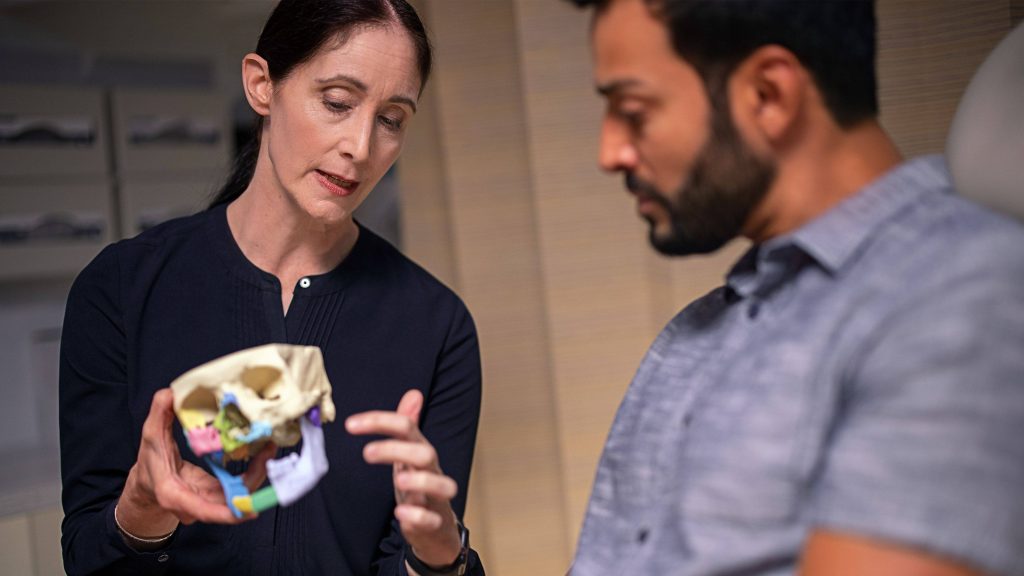-
Cancer
Mayo Clinic Q and A: Tonsil cancer: What is it and how do you prevent it

DEAR MAYO CLINIC: My brother had lingering hoarseness and a sore throat. When he finally went to the doctor, he was diagnosed with tonsil cancer. He's in treatment, but it's been tough. Chemo makes him sick, and radiation is doing a number on his throat and salivary glands, making it hard to eat. He's on a feeding tube, but he has lost a lot of weight and is fatigued. I'm worried about him. I never heard of tonsil cancer before this. I'd like to help spread awareness.
ANSWER: Dealing with a life-threatening illness — for yourself or a loved one — can be devastating. It can help to learn more. Spreading awareness and learning about prevention are so important.
Tonsil cancer is a type of head and neck cancer. Head and neck cancers include cancers of the tongue; the back of the tongue, which you can't see when you look in the mirror; the tonsils; or the throat, which includes several body parts, such as the larynx or voice box. We also see other rare cancers, including salivary gland cancers and cancers in the sinuses and nose.
Tonsils, located on the left and right sides of the back of the throat, are part of the immune system, a complex network that protects the body against infection. Tonsils are part of the lymphatic system and have lymphoid tissue. That's why they can look lumpy and bumpy. They're filled with immune cells. That same lymphoid tissue is on the surface of the back of the tongue. Cancers that arise in the tonsil or back of the tongue are classified as oropharyngeal cancer, and most of these (approximately 70%) are caused by HPV.
Head and neck cancers, especially those caused by HPV, are more common in men. The most common way in which HPV head and neck cancers are found is from it spreading into the lymph nodes in the neck. The story we often hear is, "I was shaving, and I felt a lump in my neck." Most of the time patients don't have a lot of other symptoms. They may notice discomfort when they're swallowing or a sensation that there's something in their throat that doesn't feel right.
HPV is a virus that almost everybody will get exposed to in their lifetime. The primary mode of transmission is sexual. Most people get exposed in their teenage years or early 20s. The virus typically doesn't cause any symptoms, and there is no treatment. Fortunately, most people's immune system will clear the virus from the body after exposure. However, in approximately 10% of people, the virus is not cleared, and they become chronic carriers of HPV and at risk for cancer development decades later.
HPV-associated cancers typically respond better to treatments. They tend to have a higher cure rate. We often treat HPV cancers differently than how we treat some non-HPV cancers, which are largely related to smoking and alcohol use. But we do actually see non-HPV cancers in nonsmokers as well.
When somebody is diagnosed with a type of head and neck cancer, we do a lot of testing to see if the cancer has spread into lymph nodes or other parts of the body. That helps us determine treatment.
If the cancer has not spread, treatment is individualized based on the patient's needs, and it typically includes a combination of surgery, radiation or chemotherapy. But if a patient's cancer has spread to another organ, chemotherapy and immunotherapy delivered throughout the body via the bloodstream are typical treatments.
In 2016, the Food and Drug Administration (FDA) approved immunotherapy to treat advanced head and neck cancer. What's promising for the future is the next generation of immunotherapy that aims to further engage the immune system. Research is ongoing into therapeutic vaccines that try to get the body's immune system to recognize and then fight the cancer.
Prevention, of course, is always better than treatment. While we cure most people with head and neck cancer, no cancer treatment is without long-term side effects and impact on life. While the HPV vaccine cannot prevent all cancers, it is considered a helpful measure in HPV prevention
The HPV vaccine has been available since 2006 in the U.S. It's FDA-approved for males and females ages 9 to 45. For cancer prevention, we know from studies that earlier is better, before sexual activity begins, but we also know there's still benefit over time, even up to age 45.
In addition to vaccinating yourself and your loved ones against the HPV virus, other tips to prevent head and neck cancers include:
- Stop smoking or using tobacco products. Better yet, don't start.
- Drink alcohol sparingly, if at all.
- Consider healthy behaviors, including physical activity and a plant-based diet with more fruits and vegetables.
- Katharine Price, M.D., Oncology, Mayo Clinic, Rochester, Minnesota







